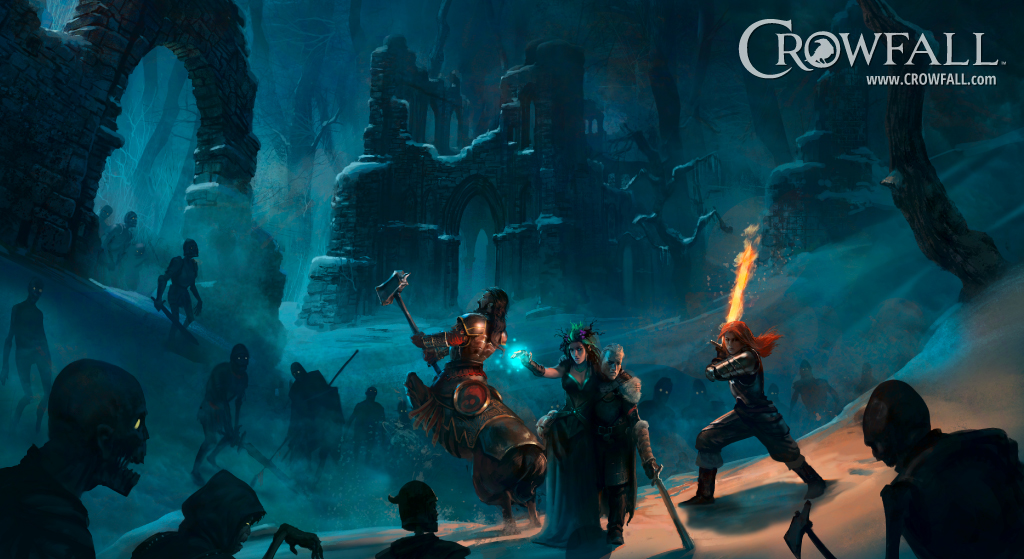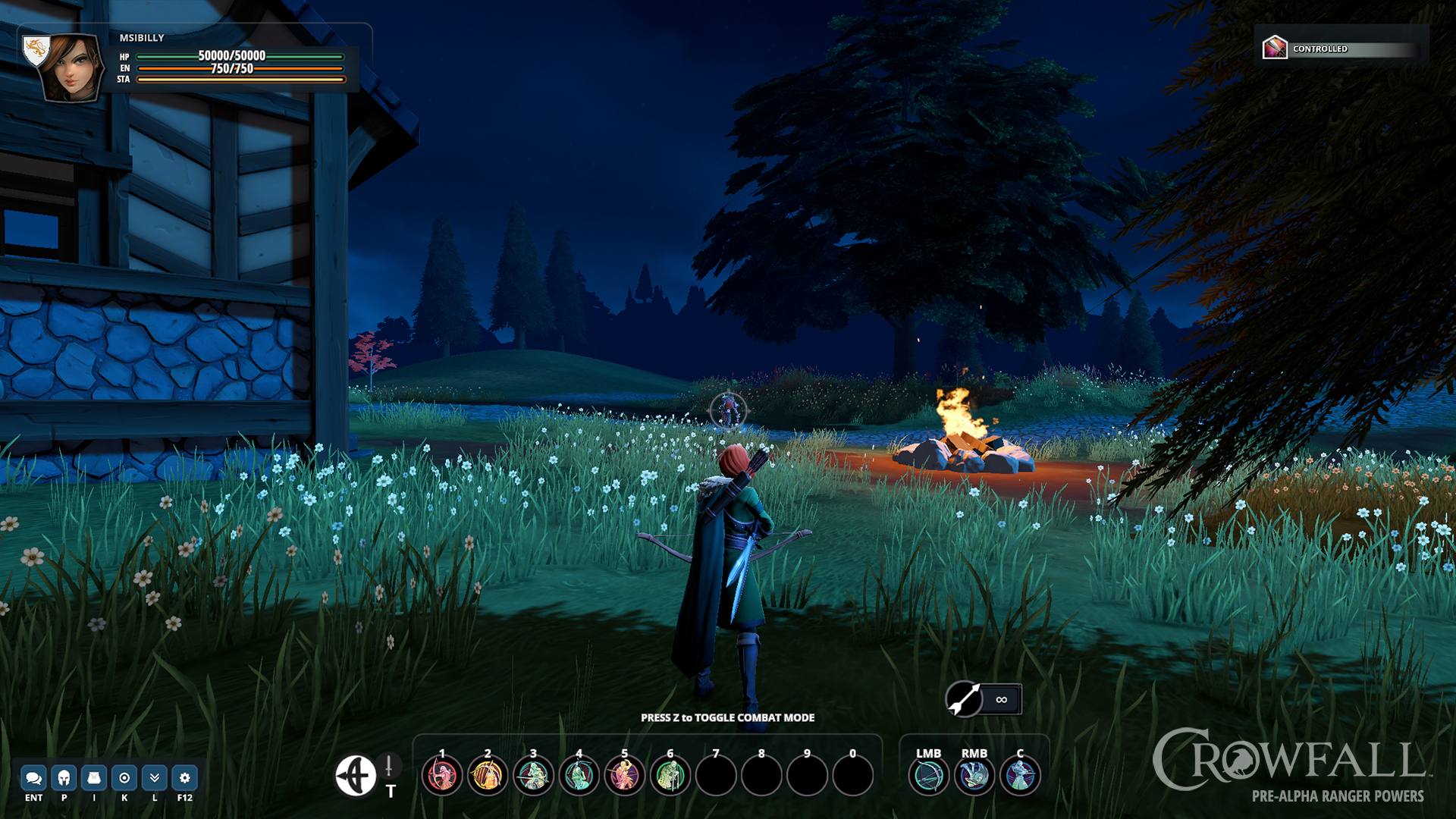Massively Multiplayer Online Games and Kickstarter haven’t exactly had a great relationship. I’m mostly saying this because, off the top of my head, I can’t think of a single example of a successful offering to have come out of the platform. That is, at least in terms of looking at such campaigns after they’ve passed their initial funding stage. You have Richard Garriott’s Shroud of the Avatar currently struggling through Early Access and Brad McQuaid’s Pantheon: Rise of the Fallen being in pre-pre-alpha two years after its inception. Then you also have Pathfinder Online, which currently seems to be transferring to a new developer after a year of silence on Kickstarter. All around, things aren’t looking very promising.
Yet here I am, about to tell you why I think ArtCraft’s Crowfall is ready to break the mould and develop into Kickstarter’s most successful MMO. Am I crazy? Perhaps, but bear with me.
First, I must say I’ve always seen MMOs as oddly addicting, gigantic time-wasters. I also used to spend unhealthy amounts of time with the original Guild Wars – that is, before doing the same thing all over again for several years became a chore more than anything else. Like many of you, my current relationship with massively multiplayer games can be summarized by a lack of time (and patience) when it comes to levelling up multiple characters and scouring countless dungeons for a measly chance of epic loot. Been there, done that, call me when the formula changes.
Crowfall, on the other hand, at least tries to do things in a different way. Unlike the examples I listed a few sentences above, it doesn’t rely on the nostalgia factor of existing MMO franchises like Pathfinder or EverQuest. Crowfall, for those of you who aren’t familiar, was successfully funded almost a year ago for $1,766,204. Headed by Todd Coleman (Shadowbane) and Gordon Walton (Star Wars: The Old Republic, Ultima Online), it also takes the MMO genre and gives it a nice spin by adding campaigns – those are essentially fully destructible worlds that exist for a few months before disappearing and getting replaced by new ones. In short, the game’s whole idea is to present an ever-changing world where only heroes and their legends are permanent, taking inspirations from strategy games with its world layout almost resembling large-scale skirmish battles. That idea in itself is enough to make me interested, and I’m even saying this without really caring a whole lot about more specific features such as the game’s action-oriented combat.
But even then, gameplay isn’t the only aspect I’m interested in. In fact, it’s ArtCraft’s dedication towards Crowfall’s Kickstarter that makes me most optimistic about the game’s future. Seeing plenty of updates, a few successful pre-alpha runs and huge amounts of weekly video content is definitely reassuring, especially in comparison to other big MMOs on Kickstarter that have sunk into the ground after being successfully funded. I should know, judging by the time it took me to find any relevant news (or lack thereof) about those. So, take this constant communication and community interaction, mix it with the game’s inherent concept which relies on a continual changing world and what you get is something that has some actual potential for being successful, both at launch and in terms of delivering plenty of end-game content.
Here’s the best part – all of these speculations of mine are arguably thanks to Crowfall’s success on Kickstarter and ArtCraft’s willingness to translate that success into building and nurturing a dedicated community throughout development. All of this is in stark contrast to the burdens of typical publisher-based funding and how restricting it can be for online games of such huge scope. Needless to say, making expansive worlds built to accommodate thousands of people simultaneously isn’t cheap, nor done fast, and the main problem comes when teams spend years of development behind closed doors only to find out they’ve made some big mistakes. EverQuest Next immediately springs to mind, its case being one full of grand promises and potential only to be met by a sudden death marked by its cancellation a few weeks. The reason was simple – apparently “it wasn’t fun”.
Thinking about EverQuest Next reminds me of how secretive its whole development was. Although the game started gaining mainstream coverage around 2012, very few knew any specifics about what its developers (Daybreak) were planning to do with. Landmark was (and still is) the company’s only publicly accessible product based on the then upcoming MMO, with that only being a sandbox builder that was planned to accommodate the main game. You could say that EverQuest Next’s pitfall was its own ambition. For me, it was Daybreak’s unwillingness to be open and flexible in their development.
As such, the main reason I’m going into so much detail in regards to this particular game and its failure is mainly to showcase how different (and successful) Kickstarter can be for developing an MMO. Going back to Crowfall, we have a game that used Kickstarter both to gain valuable attention in the media and to test the waters in terms its concept. More important, unlike the examples mentioned in the beginning of this article it used the platform to build a community as a result of it getting successfully funded for over a million dollars.
Ultimately, I think the biggest lesson here is that for an MMO to be successful there needs to be a solid community built around it. Kickstarter is one of the best places to build such a devoted group of people, and it’s then up to developers to grasp that idea and follow-up with a flexible way of development mixed with constant community updates. Not only are backers bound to a product by the money they invest, but creators also have the opportunity to roll out early tests, schedule regular updates and do all sorts of valuable PR business through the platform itself. This is partially why I think Crowfall might develop into something big, or at the very least end up being more successful than other crowdfunded MMOs.





It might be a successful MMO, maybe. At least for me my issue with MMO is not lack of patience or time, rather it’s its cancerous community (that spawns in every one of them).
I was told the same about, say, MMORPG.com ( “that cesspool” ) and all kinds of reddits before joining them, but the way I see it now – it’s more about our ability to ignore loudmouths, trolls and such.
If you can filter the noise, the great majority of people there are just silently lurking or asking a question sometimes, while there is still lots of interesting and decent ones among these that do post frequently.
I am unfortunately lacking that ability, sigh. I am frantic. Which is like being an eye-candy for every troll alive. But, i get you and you’re right. Definitely right.